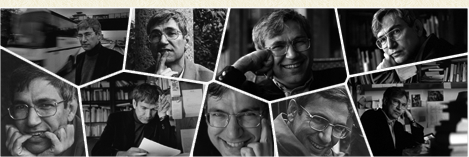A Quest Across Turkey For Love, Life and Death
By Dan Cryer
Orhan Pamuk, said to be contemporary Turkey's brightest literary comet, recently made his initial pass across my consciousness. Having just read "The New Life," Pamuk's third novel to be translated into English after "The White Castle" and "The Black Book," I'm dazzled, delighted and eager to read more.
Pamuk's homeland, it's no exaggeration to say, is terra incognita for most American readers. But if the surnames and place names initially seem off-puttingly exotic, this novel is hardly beyond our grasp. The clarity and precision of Pamuk's prose render it utterly accessible.
What's more, "The New Life" comes to us bearing a classic and universal theme. What could be more familiar than the story of a young man's search for truth and beauty?
This enchanting book combines the vertiginous surreality of a dream, the mythic resonance of a fairy tale, the heroic adventure (in ironic version) of a comic book and the sly sleight of hand of a Borges.
Osman, the narrator, begins his story like this: "I read a book one day and my whole life was changed." This "supposedly rational student of engineering" drops out of an Istanbul university, falls in love with a fellow student he hardly knows, and devotes his nights to obsessed reading of a strangely irresistible book. He is entering a labyrinth as tangled and as self-reflexive as any devised by Borges.
What is in that book, whose title we eventually learn is "The New Life”? It's never made clear, though it is said to be a tale of "murders, accidents, death and missing signs." Partly an invitation to a nirvana just beyond reach — once past the mayhem — it also seems a kind of interactive work, containing and anticipating everything in our hero's past, present and future.
In any case, Osman becomes a convert to a passion resembling a faith, eager to shed the meaningless routine of his old life and leap into the new one. no matter what the cost. He is besotted with the lovely Janan. who introduced him to the book, and jealous of Mehmet, her boyfriend. After Mehmet appears to have been shot dead by an unknown assassin, Janan vanishes. So Osman embarks on an endless series of bus trips across rural Turkey in an effort to claim the love he believes is his destiny.
What we witness on this quest is a Turkey poised uneasily between East and West. Every bus is a rattletrap nonetheless equipped with the latest movie videos featuring sex and violence, courtesy of the USA. Rest-stop food is fast food — Coca-Cola and an odd, porkless sandwich called a "hamburger." Osman's favorite sweet from his boyhood, the New Life caramel, has been supplanted by candy bars served up by Western conglomerates.
This is a book in which "coincidental" meetings are fated and bus accidents are frequent. Osman survives the crashes and delightedly encounters Janan, only to be escorted to the provincial mansion of one Dr. Fine. This elderly man turns out to be Mehmet's father and the mastermind of a xenophobic opposition to foreign cultural invasions. Fine's informers and assassins are everywhere, determined to snuff out readers of the very book that has captivated Osman and Fine's own son.
In a story that winds around itself like an Escher drawing, Pamuk offers yet another odd twist: Osman's beloved Uncle Rifki, an advocate of railroads as a means of modernization and an admirer of American comic books, is the secret author of "The New Life." Which no doubt explains his murder several years ago.
In this light. it's tempting to see the novel as a cautionary tale about the lure of false prophets in a land where ideologues of Marx and Allah struggle for the national soul. Given the author's abhorrence for fundamentalism of any stripe, this is partially what he has in mind.
But his profound uneasiness before the tidal wave of commercial flotsam washing up on Turkey's shores is equally apparent. Since Kemal Ataturk early in this century, modernizers have looked westward for guides to dragging a reluctant Turkey into the modern world. But what if the wonders of science, medicine and democracy are inevitably accompanied by a junky pop culture that bulldozes everything indigenous in its path?
At a deeper level, beyond the somewhat puerile exploration of the enigmas of time, fate and death, "The New Life" explores the pleasures and perils of reading itself. Books really can change your life. So beware their power, for good or ill. Gutenberg, that dead white European male, is Pamuk's revolutionary of choice.
Meantime, listen to the siren call of this prose: "The more I turned the pages, the more a world that I could have never imagined . . . pevaded my being and took hold of my soul ... I beheld a gaze that followed me on the journey, one that seemed to appear in the least expected places only to disappear ... a tender gaze that had long been free of guilt or blame. I longed to become that gaze. I longed to exist in a world beheld by that gaze . . . Someone had already imagined my ideas and put them down."

